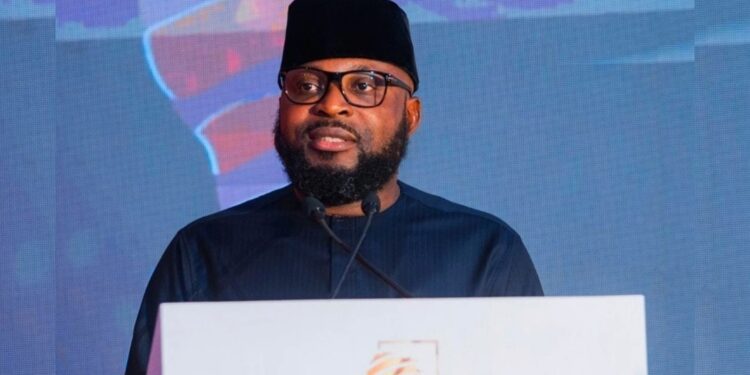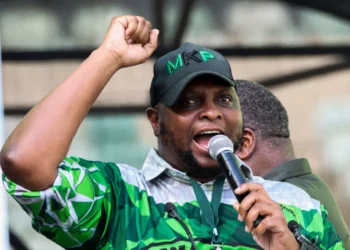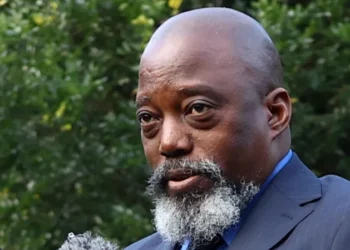By John Ikani
Although Nigeria’s much anticipated 2023 General Elections have come and gone, there are still protestations over irregularities which marred the polls that saw Senator Bola Ahmed Tinubu emerge as President-elect.
In this interview with Cally Ikpe of Violence-Free World, the Chairman of the Nigerian Young Professionals Forum (NYPF), Mr. Moses Siloko Siasia charts the path to peace and reconciliation.
The Candidate of the Peoples Democratic Movement (PDM), in the 2015 governorship election in Bayelsa State also addresses the issue of youth restiveness, the need for human capital development, and the genuine aspirations of young Nigerians for a paradigm shift in the country.
See excerpts below.
Let’s get straight into the conversation: Since the conclusion of the 2023 general elections we have been witnessing protestations that seem protracted. Looks like Nigeria’s quest for attaining national unity is on the edge or on a precipice. How dangerous do you think this is, going forward?
Yes, we are in a very dangerous place as a nation. Nigeria is currently grappling with a range of complex issues. Ethnic divisions were at an all-time high during and after the polls and there was also the issue of widespread disenfranchisement.
One of the very few positives we recorded was the high level of political awareness among young people who made their voices heard by engaging in the electoral process. Sadly, many of their preferred candidates did not emerge victorious, a development which left them feeling disheartened and disillusioned.
Consequently, disunity has become a significant problem in Nigeria. There are factions everywhere, with many people feeling disenfranchised and ethnic groups expressing dissatisfaction over the election outcome.
Therefore, it is imperative that we recognize the urgent need for national cohesion and initiate a healing process that can bring the country together. Nigeria has a bright future, and with the right approach, we can emerge stronger and more united than ever before.
Very closely related to the issues you identified are utterances that have continued to come from very iconic persons. They speak in a rather inflammatory manner. How disappointed are you when you hear public figures make incendiary statements that are capable of thwarting Nigeria’s much-needed reconciliation?
As a young Nigerian, I feel incredibly disappointed and disheartened by the proliferation of hate speech in our society. It’s deeply troubling that the divisive utterances are coming from individuals who are supposed to be role models in our society.
This toxic trend has permeated our political process and society. Unfortunately, it is now being replicated by the younger generation. Such behaviour is detrimental to our collective growth as a people and is completely unacceptable.
As Nigerians, we deserve better than this. It’s time we come together as a nation to promote a culture of unity, tolerance, and mutual respect. It’s the only way we can create a better future for ourselves and for future generations.
That’s a noble agenda you are setting before the President-elect, Senator Ahmed Bola Tinubu. Do you think he will be capable of unifying Nigerians amidst these unending waves of protestation?
To start with, the President-elect is perceived as a fatally flawed personality, with many believing that he will spearhead an ineffective administration.
Fortunately, he has an opportunity to prove that the negatives people associate him with are mere figments of imagination.
He can start by reaching out to different political blocs that were dissatisfied with the electoral process with a view to initiating the healing process that our nation deserves.
This is not rocket science. A lot of countries have gone through what we are going through at the moment, and they came out of it in one piece.
While the incoming administration prepares to take over, there’s this persistent issue of youth restiveness that has continued to taint Nigeria’s image and rock the foundations of the nation. You often hear of youth involvement in violence and in the case of the Niger Delta, oil theft. How can all these be addressed?
The population of unemployed young people in Nigeria and the consequent rise in youth restiveness is alarming. Also alarming is the exodus of millions of young Nigerians to countries like the UK and Canada.
I feel deeply troubled that leaders are not recognising the need for human capital development even when all indicators point in that direction.
Look at countries like China and Singapore. They understand human capacity development is crucial to economic growth and are reaping the rewards of investments in that direction.
We are losing a lot of people on a daily basis. It doesn’t matter whether you call it lawful migration or irregular migration, the fact remains that we are losing people.
Look at our employment space and the unemployment rates in Nigeria. It’s worrisome. As a parent, you labour to train your children through school and still shoulder the responsibility of helping them get jobs upon graduation.
When the jobs are not forthcoming they are left with the options of getting their daily bread via underhand methods or ultimately resorting to violence.
I’m afraid youth restiveness will continue to plague this nation until we prioritize human capital development.
Now, let’s look at the youth demography: you see youth anger was palpable; they wanted a paradigm shift, more like a transfer of anger from the EndSARS movement. Do you think their anger is justified and their quest is realistic?
I strongly believe that young people’s anger and aspirations are genuine. There is a calculated injustice towards the younger generation in this country, and I make this assertion wherever I go. Where are the institutions that build young people’s capacity in this country? The state of our universities is appalling.
Have you visited some of the universities we have in Nigeria today? You would be shocked by what you would see or discover. There is a lack of proper equipment, and universities are not equipped.
After their tertiary education, youths compulsorily participate in the National Youth Service Corps (NYSC). How is the NYSC of benefit to them? What were the objectives of NYSC, national cohesion and national integration! Are we truly fulfilling that purpose? We should ask ourselves these questions.
I consider myself a serious advocate for young people because I understand the values that they can bring. When we talk about EndSARS today, what proper mechanisms or steps have the government put in place to prevent it from happening again? We see political statements, hate speech, and not the appropriate actions that should be taken.
Young people are resorting to cybercrime, commonly known as “Yahoo Yahoo.” I do not condone such a lifestyle, but when the means to survive are not available, what do you expect them to do? Unfortunately, that is what we see in society today.
You’ve been quite vocal about youth demography and the interests of young people. Tell me about the Nigerian Young Professionals Forum (NYPF).
The Nigerian Young Professionals Forum (NYPF) is a nationwide organization, but it actually began as the Niger Delta Young Professionals, with a focus on the Niger Delta region.
Over time, as our programmes, projects, and engagements expanded, we received feedback from people who were impressed by our contributions and suggested that we take our work national. This was how the NYPF came into being.
Has the forum’s progress met your expectations?
We’ve been faring remarkably well. As the leader of the Nigerian Young Professionals Forum, I am proud to say that we have a membership base of over 2.5 million young people across the country and in 15 countries worldwide, including the US and the UK.
Our main goal is to mobilize young people and empower them to make a positive impact on society. We remain committed to contributing our quota to nation-building in spite of the challenges that our country is facing.
One of our main priorities is providing young people with training and capacity-building opportunities. Also, we have provided grants to help start-up businesses and secured scholarships for young people through our partnerships with various development partners.
Ultimately, we are doing a lot to reshape and also mould young people for global competitiveness.
Let’s talk about the response of leadership since you initiated NYPF. Can you say it has been satisfactory? Has there been a change in the attitude of leaders towards young people? Specifically, has the Niger Delta leaders been responsive enough?
It’s unfortunate that only a small percentage of leaders in the Niger Delta and the larger society truly understand the value that the Nigerian Young Professionals Forum brings to society.
It’s a common challenge in many African countries where the contributions and potential of young people are not fully recognized or utilized.
However, despite these challenges, the NYPF is committed to engaging leaders and making them see the value of investing in the youth and empowering them to contribute to the growth and development of the country.
And while progress may be slow, the organization will continue to push forward and work towards creating a better future for Nigeria.
More specifically, which particular governor or which particular state can you single out as being youth-conscious or sensitive to the aspirations of young people? Just name one state.
In my opinion, the percentage of state governments within the Niger Delta region that have actually impacted the lives of young people is not up to even 20% or 30%. The highest percentage I have seen is in Delta State.
Delta State is doing well in terms of government programs for young people, and I say this based on research we conducted last year about state governments in the region that have positively impacted the lives of youth. Delta State has been doing a lot in this regard.
It is important to take care of the young population because if they are not taken care of, they will take care of you, as we are witnessing in the country today with young people coming out to say “we no go gree o, we no go gree” (we refuse to be cheated).
Building roads and bridges is good, but have you ever read about the bridges or roads that were built by Mandela, Mahatma Gandhi, or Liquan Yu of Singapore? They are celebrated because of the human capacity development and transformation they engaged in, not for the infrastructure they built. This is what our leaders need to focus on.
As we wind off, I recall you made a bold move to become governor of Bayelsa State in 2015 when you were just about 35 or so. What happened to that dream because you have been quiet. Has anything changed?
I must say that nothing much has changed since I last ran for governor of Bayelsa State. However, I’ve come to realize that I need ample time to plan, organize and strategize.
When I ran for governor at the age of 35 in 2015, I contested against the incumbent seeking a second term and another former governor seeking to complete his tenure. I secured the third-highest vote out of 23 candidates in that election.
Notwithstanding, the desire to transform lives remains a core principle for me, and I am committed to it. I am currently engaging in various human endeavours, including investing in the private sector, where I have employed a significant number of young people and helped built their capacity.
I am championing the course of leadership in my own little way and hope that one day, true leaders who understand the value that young people bring to society will emerge. When that day comes, I believe that my vision of transforming lives will be actualized.
Finally, do you have any advice for young people?
My dear young people, despite the enormous challenges we face in our nation today. I urge you not to give up. This is our country, and we have all that it takes to live in a world of endless possibilities.
In today’s digitized world, you can carve out a productive niche for yourself and stay away from violence, which will not take us anywhere or lead to any meaningful development.
I implore you to be productive and engage in values that will bring about growth and development in our country. Only then will we have peace and prosperity as a people.
Remember, there is no limit to what you can achieve, so keep striving and pushing forward, and success will come. Believe in yourself and believe in Nigeria, for we have the power to make this country of ours great.


































